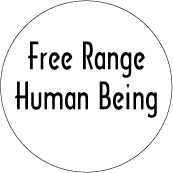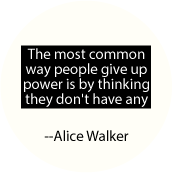A juggernaut of freedom
He proudly served
As the weakest link
In the chain of command
And above
Awe
Due no harm
This poem juxtaposes the contrasting notions of freedom achieved through tight, even militaristic, ventures versus embodying freedom through default nonviolence and decentralized decision-making. This is a command and control model versus fostering non-hierarchical and autonomous action.  My experience is that directly practicing freedom and modeling this for others is the best means for manifesting increasing freedom. Most succinctly put, this is a matter of means and ends — or rather a madder of means and end for the militarist or militant fundamentalist. Subcontracting out freedom by wholesale consenting to others’ directives strikes me as a fundamental bastardization of freedom, particularly in large militaristic bureaucracies dedicated to the end of freedom — through ever-escalating means. This is part and parcel to anarchist practice and philosophy. Anarchists value direct, unmediated experience as both a way to live and learn, in contrast to imputing authority (via consent, and ultimately responsibility) into impersonal human organizations or other impersonal social arrangements. Humanity is best experienced and served through smaller-scale, personal relationships, where the creative expressions of voluntary association and the personally uplifting experiences of mutual aid flourish.
My experience is that directly practicing freedom and modeling this for others is the best means for manifesting increasing freedom. Most succinctly put, this is a matter of means and ends — or rather a madder of means and end for the militarist or militant fundamentalist. Subcontracting out freedom by wholesale consenting to others’ directives strikes me as a fundamental bastardization of freedom, particularly in large militaristic bureaucracies dedicated to the end of freedom — through ever-escalating means. This is part and parcel to anarchist practice and philosophy. Anarchists value direct, unmediated experience as both a way to live and learn, in contrast to imputing authority (via consent, and ultimately responsibility) into impersonal human organizations or other impersonal social arrangements. Humanity is best experienced and served through smaller-scale, personal relationships, where the creative expressions of voluntary association and the personally uplifting experiences of mutual aid flourish.  The title of this poem, “Chains of command,” is a pun — a double meaning — directly linking the shackling of freedom to systems of command and control. Anarchists are renown for their issues with authority. Less well appreciated is their fundamental critique of large, impersonal ventures which are viewed as the primary threat to our individual and collective humanity. Anarchists seek to live on what is considered a human scale, which is necessarily smaller-scale — you can only relate personally to a finite number of people — and decentralized in that your set of relationships is an organic, even alive, entity that is guided by free association and mutual aid. While anarchists are often portrayed as dangerous (perhaps to many forms of social order) and cavalier (perhaps revealing how foreboding freedom can be), there is a certain humility built into the anarchist worldview; there is a profound lack of ambition to control others (and be controlled) through the bulk of social arrangements in modern, so-called civilization. The hubris necessary for violence is for me the best example. Now, the brand of anarchist practice that I would ascribe to might be referred to as green anarchism, where violence is not understood to be an integral and necessary part of being human. So-called black anarchists might view the violence inherent in the present social order as necessitating violent responses. My view of freedom does not consider violence as necessary to being human, though the choice to be subject to violence as opposed to inflicting it remains a difficult and necessarily challenging one. Clearly the current world order considers violence as merely the order of the day, a necessity, outside the realm of free choice. The last lines of the poem are a tribute to a pacifist green anarchism, and the deep humility it engenders: And above/Awe/Due no harm. Of course, this is a take on the Hippocratic Oath: Above all, do no harm. Plus, the “Due no harm” alludes to the vision of a world where the cycles of violence are broken and there is no longer the cruel divide of victim and perpetrator. To go full circle, we must cast off the chains of command. May you find the freedom and courage to pay the cost of boldly adding your beautiful human life to the mix of humanity where fear and misunderstandings and inertial privilege stand in the way of our individual and collective humanity.
The title of this poem, “Chains of command,” is a pun — a double meaning — directly linking the shackling of freedom to systems of command and control. Anarchists are renown for their issues with authority. Less well appreciated is their fundamental critique of large, impersonal ventures which are viewed as the primary threat to our individual and collective humanity. Anarchists seek to live on what is considered a human scale, which is necessarily smaller-scale — you can only relate personally to a finite number of people — and decentralized in that your set of relationships is an organic, even alive, entity that is guided by free association and mutual aid. While anarchists are often portrayed as dangerous (perhaps to many forms of social order) and cavalier (perhaps revealing how foreboding freedom can be), there is a certain humility built into the anarchist worldview; there is a profound lack of ambition to control others (and be controlled) through the bulk of social arrangements in modern, so-called civilization. The hubris necessary for violence is for me the best example. Now, the brand of anarchist practice that I would ascribe to might be referred to as green anarchism, where violence is not understood to be an integral and necessary part of being human. So-called black anarchists might view the violence inherent in the present social order as necessitating violent responses. My view of freedom does not consider violence as necessary to being human, though the choice to be subject to violence as opposed to inflicting it remains a difficult and necessarily challenging one. Clearly the current world order considers violence as merely the order of the day, a necessity, outside the realm of free choice. The last lines of the poem are a tribute to a pacifist green anarchism, and the deep humility it engenders: And above/Awe/Due no harm. Of course, this is a take on the Hippocratic Oath: Above all, do no harm. Plus, the “Due no harm” alludes to the vision of a world where the cycles of violence are broken and there is no longer the cruel divide of victim and perpetrator. To go full circle, we must cast off the chains of command. May you find the freedom and courage to pay the cost of boldly adding your beautiful human life to the mix of humanity where fear and misunderstandings and inertial privilege stand in the way of our individual and collective humanity.


